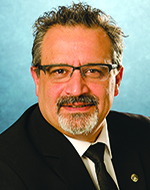Page Content
From One Phase To Another
“The act of ending your working or professional career.”
“The period after you have permanently stopped your job or profession.”
These sentences are among the definitions of retirement contained in Webster’s dictionary.
 During my years as president, at local events throughout the province, I’ve had the opportunity to see the endless grins and relaxed, free breathing exhibited by retiring colleagues, all suggesting that the stress of tomorrow’s class or lesson is no longer. However, the appearance of the word stop in Webster’s definitions makes me stumble.
During my years as president, at local events throughout the province, I’ve had the opportunity to see the endless grins and relaxed, free breathing exhibited by retiring colleagues, all suggesting that the stress of tomorrow’s class or lesson is no longer. However, the appearance of the word stop in Webster’s definitions makes me stumble.
I do not believe that teachers work with young people for 20 or 30-plus years and just abruptly stop. Once you have been an active classroom teacher, you are forever a teacher.
Also, in many imaginable contexts, sudden stops are detrimental. I believe that transitions are more apropos. Just as we begin our careers with an induction phase, a transition into the profession, so it is true that when we leave our roles as teachers, it’s more of a transition than a sudden stop.
Looking again at Webster’s, I would suppose that, when referring to teachers, the definitions of retirement are missing one key word: active. More complete definitions could be: “retiring from active teaching” or “the act of ending your active professional career,” for it is active involvement, the continual development of relationships with students, colleagues, parents and others that make a teaching career. Within this context, we teachers never really retire—we transition to another phase of our lives as teachers.
Then again, this word active is tricky. Does retiring from active classroom teaching mean you’re no longer an active teacher? Maybe not.
The Alberta Teachers’ Association’s special local of retired teachers is a testament to colleagues being active in the profession after having transitioned away from active teaching. These colleagues still have so much to give, continuing to shape and influence policy within the profession and sharing their views on education issues today. As I suggested in my annual address to these local members two years ago at their annual general meeting, “You are RED … Retired and Extremely Dangerous!” These colleagues have time, energy and expertise—a combination of traits that make others stand up and listen. I guess this would be classed as no longer actively teaching but, in my mind, not permanently removed from the profession.
Over the years, one of the benefits we have fought for, carefully nurtured and developed is our pension plan. Teachers work very hard throughout their careers and do have a pension they can rely on when they leave the classroom. Given this, perhaps retirement can be defined as “one in receipt of a pension!”
Because we never really cease to be teachers, we need a category that Webster’s did not consider. We are lifelong learners, active in our profession and forever moving from phase to phase in our lives. We don’t permanently stop our job or profession.
I’ve most recently referred to our careers as a story, so perhaps, rather than trying to define what retirement is, it’s more fitting to view it as another chapter of every teacher’s story. Each one of us pen a small slice of the overall story of education in our province, the never-ending story that continues to unfold and be the foundation of education in Alberta. Our organization, the Alberta Teachers’ Association, is the collection of stories of all Alberta teachers.
In that vein, to every colleague who’s moving on to that next unknown phase we call retirement, I offer a simple good-bye, a heartfelt thank you and wish you well as you pen the final chapter of your personal story, your personal story of education.
